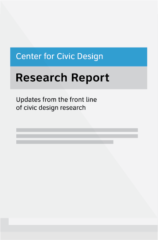Civic Design Fellowship
The Civic Design Fellow is a 4-month program to take your interest in democracy as a design problem to the next level, working with the Center for Civic Design team and completing an independent project exploring the intersection of language access and voting participation.
About the Fellowship
The Civic Design Fellowship is a paid opportunity for an early-career professional in UX or an adjacent field to develop their superpowers and take a step towards a career in civic design and research, building a portfolio and gaining broad experience.
The independent project focuses on challenges in the voter experience and how design can explore and address the issue, and any other context. The work might be represented in a research report, a website, or work in another medium.
Fellows bring experience in both UX design, research, or a UX-adjacent field and working in communities with low civic participation. Other qualifications vary from year to year as needs in elections change. In 2022, the Fellowship is focused on outreach to multi-lingual communities and helping election officials meet new federal language access requirements.
Fellows’ activities include:
- Meet election officials and others working in civic design to learn more about the field.
- Conduct their own independent project. You’ll propose a topic during the application process. Then, we’ll help you refine the idea and plan the project. You will have staff support through planning, implementation, and final report. And you’ll leave the Fellowship with a completed project for your civic design resume.
- Work on CCD projects covering a range of topics and methodologies, giving you a well-rounded experience of our work and impact. You’ll contribute your own skills and work alongside staff with a wide range of expertise — including design, research, usability testing, language access, and plain language.
- Join our regular team-life meetings and contribute to internal conversations. We use this time to discuss projects and civic or election-related news, tackle design challenges together, and try out new ideas.

Robert Pérez, 2022
In 2022, Robert joined CCD for 4-months during which time he led an independent research project on bilingual youth voters in San Mateo County, California.
In a series of moderated interviews, he set out to hear stories from bilingual citizens about their experiences to discover pain points and barriers to accessing voter registration information, civic engagement, and the next steps in the voting process.

Mark D’Ostilio, 2020
In 2020, Mark came to CCD through the Penn State Nevins Fellowship. To support voting by mail in the pandemic, he researched state laws as we adapted our templates for local election offices. He also assisted with usability testing, learning it as a new skill.
His project used his degree in criminology to explore how easy it is for people leaving prison to know whether they are eligible to vote. He found that missing or hard-to-understand information can also be a barrier to voting. His report includes a profile of 4 states, with recommendations, and sample web pages with the types of information people need to understand their rights.
Why the Center for Civic Design
Elections are the centerpiece of democracy. Center for Civic Design works with voters, elections offices, and advocacy groups to make elections work better and invite participation for everyone.
We are focused on making it easier for everyone to vote. Our work help voters who face historical barriers, speak other languages, have disabilities, or don’t read well, solving wicked problems to make it easier for voters to vote the way they intend.
We are nationally recognized. Our best practices for election design are used across the country. We research, design, and implement new approaches to the voter experience, from registering to vote to ‘curing’ a mistake on a mail-in ballot. And, we create tools and templates for states and advocates so that those groups can build their civic design capacity.
You get to work with great people. We bring together many diverse backgrounds, design and research skills, and insights from many academic disciplines so we can work together to make a difference.

